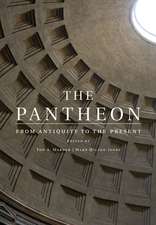Design for Critical Care: An Evidence-Based Approach
Autor D. Kirk Hamilton, Mardelle McCuskey Shepleyen Limba Engleză Hardback – 21 ian 2016
psychology, and sociology of those who experience it. When designing a critical care unit,
the demands on the architect or designer working together with the interdisciplinary team
of clinicians are highly specialized. Good design can have a hugely positive impact in terms of the recovery of patients and their hospital experience as a whole. Good design can also contribute to productivity and quality of the work experience for the staff.
Design for Critical Care presents a thorough and insightful guide to the very best practice
in intensive care design, focusing on design that has been successful and benefi cial to both
hospital staff and hospital patients. By making the connection between research evidence and design practice, Hamilton and McCuskey Shepley present an holistic approach that outlines the future for successful design for critical care settings.
| Toate formatele și edițiile | Preț | Express |
|---|---|---|
| Paperback (1) | 675.61 lei 6-8 săpt. | |
| Taylor & Francis – 30 sep 2009 | 675.61 lei 6-8 săpt. | |
| Hardback (1) | 1011.30 lei 6-8 săpt. | |
| Taylor & Francis – 21 ian 2016 | 1011.30 lei 6-8 săpt. |
Preț: 1011.30 lei
Preț vechi: 1233.29 lei
-18% Nou
Puncte Express: 1517
Preț estimativ în valută:
193.50€ • 203.12$ • 160.62£
193.50€ • 203.12$ • 160.62£
Carte tipărită la comandă
Livrare economică 10-24 aprilie
Preluare comenzi: 021 569.72.76
Specificații
ISBN-13: 9781138137370
ISBN-10: 1138137375
Pagini: 328
Dimensiuni: 189 x 246 x 33 mm
Greutate: 0.77 kg
Ediția:1
Editura: Taylor & Francis
Colecția Routledge
Locul publicării:Oxford, United Kingdom
ISBN-10: 1138137375
Pagini: 328
Dimensiuni: 189 x 246 x 33 mm
Greutate: 0.77 kg
Ediția:1
Editura: Taylor & Francis
Colecția Routledge
Locul publicării:Oxford, United Kingdom
Public țintă
Professional Practice & Development and Professional ReferenceCuprins
Part One: Better Design for Better Outcomes; Chapter 1: Evidence-Based Design and Applied Research; Chapter 2: Facility Design for Critical Care; Part Two: The Physical Setting; Chapter 3: Design of the Unit; Chapter 4: Design of the Patient and Family Spaces; Chapter 5: Design of the Staff Support Spaces; Part Three: Research on Persons and Environment; Chapter 6: Creating Therapeutic Environments for Critical Care; Chapter 7: The People; Chapter 8: Activities and Behavior; Part Four: Path to a Bright Future; Conclusion; Appendix; References; Index
Notă biografică
D. Kirk Hamilton is a director emeritus for the Center for Health Design, a fellow of the Center for Health Systems and Design, professor of architecture at Texas A and M University, and a founding principal of Emeritus, WHR Architects.
Mardelle McCuskey Shepley is director of the Center for Health Systems and Design and the William M. Pena professor of architecture at Texas A and M University.
Mardelle McCuskey Shepley is director of the Center for Health Systems and Design and the William M. Pena professor of architecture at Texas A and M University.
Descriere
It is now widely recognized that the physical environment has an impact on the physiology, psychology, and sociology of those who experience it. When designing a critical care unit, the demands on the architect or designer working together with the interdisciplinary team of clinicians are highly specialized. Good design can have a hugely positive impact in terms of the recovery of patients and their hospital experience as a whole. Good design can also contribute to productivity and quality of the work experience for the staff.
Design for Critical Care presents a thorough and insightful guide to the very best practice in intensive care design, focusing on design that has been successful and beneficial to both hospital staff and hospital patients. By making the connection between research evidence and design practice, D. Kirk Hamilton and Mardelle McCuskey Shepley present an holistic approach that outlines the future for successful design for critical care settings.
Design for Critical Care presents a thorough and insightful guide to the very best practice in intensive care design, focusing on design that has been successful and beneficial to both hospital staff and hospital patients. By making the connection between research evidence and design practice, D. Kirk Hamilton and Mardelle McCuskey Shepley present an holistic approach that outlines the future for successful design for critical care settings.







